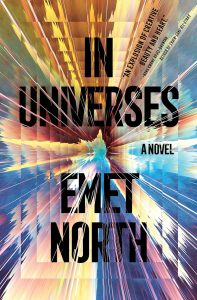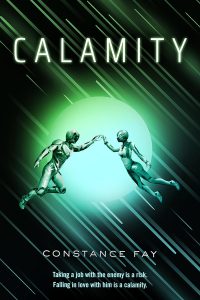Niall Harrison Reviews In Universes by Emet North
 In Universes, Emet North (HarperCollins 978-0-06331-487-0, 240pp, $26.99, hc) April 2024.
In Universes, Emet North (HarperCollins 978-0-06331-487-0, 240pp, $26.99, hc) April 2024.
Much like time travel, the multiverse, as a scientifically originated but unproven theory, can be used as a narrative conceit with varying degrees of rigour. For every Timescape a Doctor Who; for every Anathem an Everything Everywhere All at Once. I don’t think a work’s placement on this spectrum is a predictor of its quality, but it has consequences for the story told, not least the nature of the stakes in play: Broadly speaking, I’d suggest, the fewer discernible rules a multiverse has, the more likely a story set within it is to focus on an individual’s identity and perceptions. This is certainly true of Emet North’s novel-in-stories In Universes. Despite an opening in which its protagonist, Raffi, is a physicist searching for evidence of dark matter, the book quickly signals its direction by having Raffi give up physics in favour of philosophy and becomes, by its halfway point, a work in which the universes visited do not always operate according to the laws of physics that we currently understand. From a universe in which a woman can bear an octopus as a child, to one featuring a little ghost, to one in which people fracture into “motherhordes” of animals after giving birth: throughout, the reference point is Raffi. The novel’s success turns on an emotional arc, not a narrative one.
It is in that sense a solipsistic novel. The various universes visited, one per chapter, do seem to have independent reality, but most of them feel as though they exist as a sandbox to help Raffi process a particular trauma from childhood: succumbing to peer pressure, Raffi pulled away from helping a young woman, with (in at least one universe) tragic consequences. This does not prevent several of the chapters proving exceptional both for their invention and their emotional texture. The most striking for me was the aforementioned “motherhorde” universe, which extrapolates from a solid-gold opening line (“My mother is a horde of bees”) an extended riff on bodily autonomy, parent-child relationships, and queer and trans politics. When some individuals begin fracturing seemingly at random, without having given birth, people take to the streets (complete with “not everyone who fractures is a woman” banners), and researchers identify a potential link with matrilineal trauma, which prompts Raffi to reflect movingly on her Jewish heritage and upbringing. But the risk of the format is that sometimes the shift to a new universe will leave a reader cold, which happened for me a couple of times: I experienced the one with the ghost as a speed bump, a story reaching for that hard-to-define Kelly Link-ish space between weirdness and whimsy, but not quite grasping it. This type of mosaic story is a bigger risk, I think, than a writer takes with a short story collection per se, where you expect ups and downs. I find that with a book like In Universes, the downs become more of a slog because they nevertheless feel necessary.
In this case what makes them feel necessary, what binds the universes together, is a gradually elaborated argument about embodiment, about what it means to relate identity to body. In each universe we meet a different version of Raffi and, arrayed around Raffi, different configurations of a cast of recurring characters, who shift between roles as friends, mentors, lovers, and others. These characters change not only their relationship to Raffi, but their sexuality and gender in a way that reminded me a little of the first half of Jennifer Marie Brissett’s Elysium (2014), in that it avoids suggesting that any one version is the true and definitive version. (Raffi changes as well: Sometimes she/her, sometimes they/them.) Animal bodies recur as a source of invasion or transformation – the motherhordes, the pregnancy, a universe in which aliens have taken over the bodies of aliens and are attacking humans – such that when Raffi thinks of “shedding childhood like snakeskin” or reflects that “My body felt like a part of me, as undeserving of criticism as any animal’s body,” there is an extra layer of resonance. Nor is Raffi always so generous about her/their human body. Often it is confounding but unignorable, reflecting on “the strange it of their body” as she/they get into a bath, or considering that “letting men use my body… felt safer than owning it myself.” Even towards the end of the novel, Raffi finds herself thinking of a tentative new relationship in these terms: “I don’t know how to have a body around them, how to be a body.”
“There are,” Raffi informs us on the first page, “some things in the universe you can only find by looking away from them.” By the end of the novel this has a corollary: “some things in the universe you can only find if you’re looking for them.” Between those two philosophies is the measure of In Universes, and the measure of Raffi. By the end they have looked, and seen, and been seen, and come to terms. Everything on every page feeds into this: It’s Raffi’s multiverse, and we’re just along for the ride.
In Niall Harrison‘s spare time, he writes reviews and essays about sf. He is a former editor of Vector (2006-2010) and Strange Horizons (2010-2017), as well as a former Arthur C. Clarke Award judge and various other things.
This review and more like it in the June 2024 issue of Locus.
 While you are here, please take a moment to support Locus with a one-time or recurring donation. We rely on reader donations to keep the magazine and site going, and would like to keep the site paywall free, but WE NEED YOUR FINANCIAL SUPPORT to continue quality coverage of the science fiction and fantasy field.
While you are here, please take a moment to support Locus with a one-time or recurring donation. We rely on reader donations to keep the magazine and site going, and would like to keep the site paywall free, but WE NEED YOUR FINANCIAL SUPPORT to continue quality coverage of the science fiction and fantasy field.
©Locus Magazine. Copyrighted material may not be republished without permission of LSFF.







